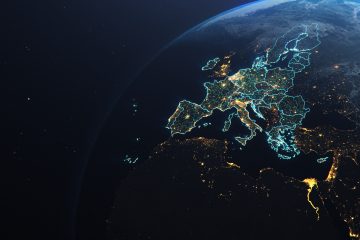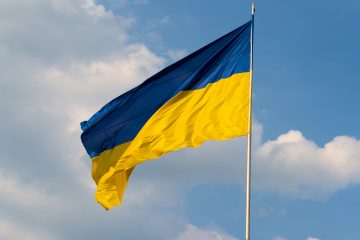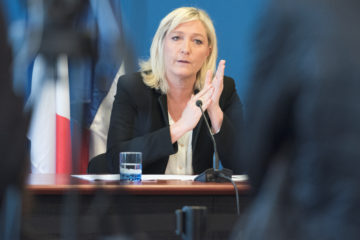
Finger-Pointing Across the Channel: EU as ‘Other’ in UK Government’s Post-Brexit Discourse
Despite leaving, the EU remains the UK’s significant, constitutive other. Even post-Brexit, the British sense of self is being claimed by defining the EU as ‘Other’. Naturally, since 2016, the character of this ‘Other’ has evolved. Following the referendum, and especially Brexit itself, the UK-EU relationship has undergone a transformation of redefining each/the other. One might have expected that, once the UK had left the EU, the mutual relationship would run more smoothly. Yet, the opposite has been the case. Boris Johnson’s government was keen to pick fights with the EU and “regularly and deliberately spark arguments” with it. Since the UK (nominally and practically) left the EU on 31 December 2020, the mutual relationship has been marred by numerous …

OxPol Blogcast. Politics, Re-Imagined — Democratic Backsliding with Vicente Valentim
As we witness a rise in radical right politics in Europe and beyond, our host Cassandra van Douveren speaks to Dr. Vicente Valentim, a Postdoctoral Prize Research Fellow at Nuffield College at the University of Oxford. Vicente’s work focusses on the role of social norms in normalising the expression of views and behaviours associated with authoritarianism. Join us as we discuss his upcoming book, The Normalisation of the Radical Right: A Norms Theory of Political Supply and Demand (forthcoming: September 2024), pathways to restore democratic norms and Vicente’s hopes for the future. Politics, Re-Imagined is a series by the Department of Politics and International Relations (DPIR) at the University of Oxford focused on exploring tangible and sustainable solutions to the …

Who governs? When and why governments appoint technocrats?
One of the most critical questions of modern comparative politics is: who governs? The first thing that would come to mind would be party politicians. However, transformations in several European countries’ governmental arena indicate that partisan presence in office, and, more broadly, the general model of party government, characterised by parties’ centrality in representing the needs and demands of citizens, is in decay. Such a decline owes much to the increased government involvement of technocratic personnel – i.e., ministers with no political affiliation. Indeed, while Italy established itself as the promised land of technocracy, currently led by Mario Draghi and by four technocratic prime ministers in the last two decades, technocratic ministers have also entered the last three partisan governments …

A Marshall Plan for Ukraine?
As policymakers and commentators grapple with understanding the direction of Russia’s invasion of Ukraine, they turn to the past for guidance. Are we at the beginning of a more general war –1914 or 1939? Or is the experience of how major wars end a guide? The Marshall Plan of 1948-1951 is all over the news as discussions get under way about the hoped-for recovery of Ukraine. “The war in Ukraine has caused the world, particularly the west, to look to the past for answers…. Marshall Plan history is no longer a niche,” says the Financial Times’s Gillian Tett. EU Commissioner Johannes Hahn, Prime Minister Boris Johnson, magazines like New Statesman, and think tanks like the Center for Economic and Policy …

Can Marine Le Pen win the French Presidency?
This piece is based on an article first published on The Loop, ECPR’s Political Science Blog. With the 1st round of the French presidential elections only a few days away, the incumbent Emmanuel Macron (La République en Marche) continues to lead the polls (opinion-way.com) with 26-27% of vote intentions, followed by Marine Le Pen (Rassemblement National) at 22-23% and with Jean-Luc Mélenchon (La France Insoumise) in third place at 16-18%. All the other candidates seem out of the race. Even those who were once seen as possible contenders, in particular Éric Zemmour (Rêconquete) and Valerie Pécresse (Les Républicains) trail at around 9-10%, with little chance of qualifying for the 2nd round. Last autumn, a repeat of the 2017 Macron-Le Pen duel …
In the Court of Public Opinion: Judicial Supremacy v. The Rule of Law
This is a brief reply to the review of my monograph, Transnational Networks and Elite Self-Empowerment: The Making of the Judiciary in Contemporary Europe and Beyond (OUP 2019) by LSE Human Rights Prof. Conor Gearty, Vice-President of the British Academy. I am grateful to Prof. Gearty for reviewing my monograph at such length. I am replying here in hopes that the exchange may advance our understanding of outstanding questions about Judiciary institutional design (and designers)—a topic that receives insufficient attention. This is a summary of my full reply to Gearty, which is accessible here. Gearty and other critics are invited to rebut my challenges to the legitimacy and desirability of the judicialisation of politics. First, I will try to summarise …
Within the EU, Redistributive CAP Mechanisms Can Make a Big Difference for Small Farms
The proverbial thunderclouds are finally dispersing over the fields and farms of Europe. The protracted negotiations over the European Union’s next Common Agricultural Policy (CAP) budget, which began in 2018, finally concluded in June with a provisional agreement between the EU’s Commission, Council, and Parliament. While the storm is not officially over – Parliament must ratify the deal in the coming autumn – the warring factions have retreated to lick their wounds for the time being, with both environmentalists and small farmers frustrated that the final proposals either did not address their demands or did so in a watered-down fashion. Of particular concern to small farmers’ groups is the mandatory implementation of policies designed to redistribute CAP funds and level …
What if We Talked about Foreign Policy? Italy’s Opportunities for Global Leadership in 2021
After the Cold War and the fall of the First Italian Republic, Italy struggled to formulate a coherent foreign policy strategy. Generally, foreign policies at global level during the Cold War era were dictated by the bipolar relationship between the United States and the Soviet Union. Italian foreign policy, therefore, was a function of the United States’ sphere of influence and interests, and Italy was often a bridge and interlocutor for the Americans to the Middle East or Eastern Europe. With the collapse of the bipolar system and the disintegration of the major Italian political parties that were the core political actors in the aftermath of World War Two, Italian foreign policy was partially dictated by individual figures and was …









